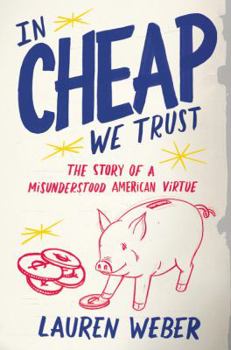In Cheap We Trust: The Story of a Misunderstood American Virtue
Select Format
Select Condition 
Book Overview
Cheap suit. Cheap date. Cheap shot. It's a dirty word, an epithet laden with negative meanings. It is also the story of Lauren Weber's life. As a child, she resented her father for keeping the heat at... This description may be from another edition of this product.
Format:Hardcover
Language:English
ISBN:0316030287
ISBN13:9780316030281
Release Date:September 2009
Publisher:Little Brown and Company
Length:310 Pages
Weight:1.00 lbs.
Dimensions:1.1" x 5.7" x 8.5"
Customer Reviews
3 ratings
Frugal not cheap.....
Published by Thriftbooks.com User , 14 years ago
Cannot tell you how many books I have acquired on the issue of simple, frugal, cheap living over the years. Its a topic near and dear to my heart,since unlike many of my peers, I valued the wisdom my parents and grandparents had taught me about living well during the Great Depression and WW2, because they didn't waste anything and were wise in knowing the different between a need and a want. What makes this book fun as well as informative is how the author shows how wasteful we have become as a society in the last forty years. She is also smart because she shares with the reader the difference between being wise and being foolish. Like not eating extreme out of date canned food, and learning the signs of food that shouldn't be saved or eaten. Like temperature sensitive foods, be it seafood that smells spoiled and probably is, which is needed info is you are into the freegan movement also called dumpster diving. She also reminds the reader to think before they consume, which is the beginning of stopping waste. She reuses plastic bags, whereas I never buy them. Used to save the zip lock bags my flour tortillas came in but now I make my own tortillas. And the book is geared more for the city person. Back in the 70's Amy Dacyczyn started teaching people about this type of living in her excellent Tightwad Gazette which is still available for purchase. As a rural homesteader I also want to recommend two magazines that are part of my home library. Backwoods Home and Back Home magazines have similar information as In CHEAP We Trust but geared toward saving money if you have animals and grow most of what you eat. No doubt once the economy bounces back most people will resort to their old ways, which often includes looking down on people who live by the adage 'waste not want not,use it up, wear it out, find a need or do without. This has been my observation.But its refreshing to see a younger person who is sharing her frugal wisdom.
A book for spenders, savers and all those in between
Published by Thriftbooks.com User , 14 years ago
In Cheap We Trust is a captivating portrait of America's conflicting attitudes toward saving, spending, and splurging. Weber manages to get across serious economic concepts in a book that reads like a guilty pleasure. She accomplishes this by leavening the theoretical and historical backstory of cheapness with touches of memoir and biographical sketches of spectacular spendthrifts and champion cheapskates (including Weber and her thermostat-policing father). She addresses thrift's applicability to today's issues but deftly avoids oversimplified proscriptions. Combine all this with a non-preachy, smart-but-fun tone and you have quite a feat. In Cheap We Trust, an important, digestible book for anyone who wants a smart perspective on our country's wallet.
Cheap is the New Black
Published by Thriftbooks.com User , 14 years ago
Actually, Lauren Weber's words are "Cheap is the new green," and are her hopeful nod to ecology as the prompt that might finally make frugality sexy in America. Because, to date, nothing else has much tempered its persistent unpopularity and negative connotations with miserliness, self-denial and unworthiness. To be clear, it's primarily frugality and thrift that Weber explores here (as in the economical use of resources ... living simply and mindfully, without waste), and cheapness (as in consuming inexpensively) to a lesser degree. In a journalist's voice, she writes about the history of thrift and spending from the Puritans and Quakers to Emerson and Thoreau; from wartime rationing to the expanded postwar industrial capacity that spurred consumerism; from the origin of savings banks, through the growth and decline of home economics, to the Depression and today's financial crisis. She also explores economics, sociology and a number of competing tensions. For example, is it good citizenship to demonstrate personal responsibility through personal savings, or better to support the national (even global) economy by spending? If you do spend, should it be on "productive" (essential) goods with their long-term economic benefit and not on "consumptive" (luxury) goods? Do your personal savings on ultra-inexpensive imported goods outweigh their high political and environmental costs? And what about advertising, forced obsolescence, ego gratification and keeping up with the Joneses? Readers with any level of interest in frugality will find themselves repeating the WWII mantra, "Use it up, wear it out, make it do or do without," and will see themselves described in this book -- somewhere along Weber's continuum from Dumpster-diving freegans to folks who simply believe that less is more.




